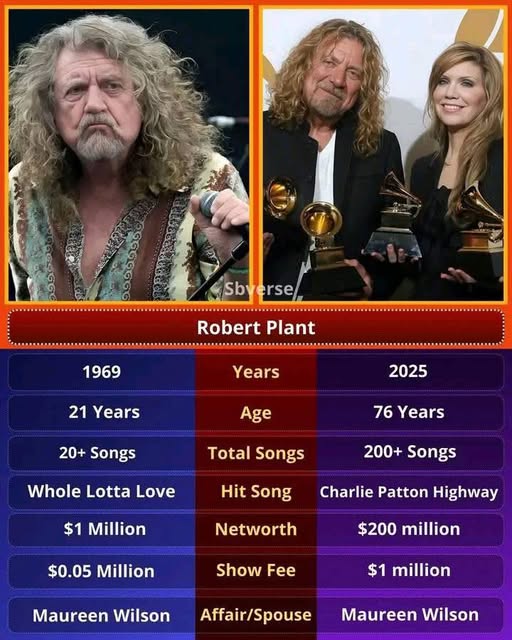
Robert Plant, the iconic lead singer and lyricist of the legendary rock band Led Zeppelin, is widely celebrated as one of the most influential and charismatic frontmen in rock history. Known for his soaring vocals, golden curls, and mystical lyricism, Plant helped define an era of rock and roll, pushing musical boundaries and inspiring generations of musicians.

Early Life And Musical Roots
Born on August 20, 1948, in West Bromwich, Staffordshire, England, Robert Anthony Plant showed an early passion for music. Influenced by Elvis Presley, blues legends like Robert Johnson, and the burgeoning British blues scene, Plant began singing in local bands in the mid-1960s. It was his raw vocal power and expressive style that eventually caught the attention of guitarist Jimmy Page, who was forming a new band following the dissolution of The Yard birds.
The Birth Of Led Zeppelin
In 1968, Plant joined Jimmy Page, bassist/keyboardist John Paul Jones, and drummer John Bonham to form Led Zeppelin. From the outset, the band had an explosive sound that blended blues, hard rock, folk, and psychedelia. Plant’s vocal range and theatrical stage presence became a hallmark of the group’s identity.
Their debut album, Led Zeppelin (1969), was an instant success, and Plant’s performances on tracks like “Dazed and Confused” and “Babe I’m Gonna Leave You” helped set the tone for the band’s powerful, otherworldly aesthetic.
Lyricism And Mythology
As the band’s principal lyricist, Plant was drawn to mythology, mysticism, and romantic imagery. He incorporated themes from J.R.R. Tolkien’s Middle-earth, ancient legends, and Eastern philosophies, particularly in songs like “Ramble On” and “Kashmir.” His lyrical style brought a poetic and sometimes cryptic dimension to Led Zeppelin’s music, elevating it beyond mere rock anthems.
Musical Legacy With Led Zeppelin
Led Zeppelin’s run from 1968 to 1980 was marked by creative innovation and monumental success. Albums like Led Zeppelin IV (1971), which featured the timeless classic “Stairway to Heaven,” solidified their place in rock history. Plant’s voice—capable of both tender nuance and fierce power—defined the emotional range of the band’s catalog.
The band’s thunderous live performances, with Plant often at the center, became the stuff of legend. Whether wailing through “Whole Lotta Love” or crooning the blues on “Since I’ve Been Loving You,” he captivated audiences worldwide.
Tragedy And Reinvention
Led Zeppelin disbanded in 1980 following the tragic death of drummer John Bonham. While the band’s era had ended, Plant’s musical journey was far from over. He embarked on a solo career, continually reinventing himself and exploring genres beyond rock, including blues, folk, country, and world music.
Albums such as Pictures at Eleven (1982), Now and Zen (1988), and Mighty ReArranger (2005) showed Plant’s commitment to artistic growth and refusal to rest on past laurels.
Later Collaborations And Critical Renaissance
In 2007, Plant’s collaboration with bluegrass singer Alison Krauss on Raising Sand earned widespread critical acclaim and five Grammy Awards, including Album of the Year. Their haunting harmonies and genre-blending sound introduced Plant to a new audience and showcased his musical versatility.
Influence And Recognition
Robert Plant’s influence on rock vocals and performance style is immeasurable. Artists across genres cite him as a key inspiration. In 2006, Hit Parader ranked him the greatest metal vocalist of all time, and in 2011, Rolling Stone placed him atop their list of the 100 Greatest Singers of All Time (as voted by other musicians).
Conclusion
Robert Plant’s journey from West Midlands blues fan to rock god is a testament to his restless creativity, sonic curiosity, and uncompromising artistry. As the legendary voice of Led Zeppelin and a continually evolving solo artist, Plant has carved a legacy that transcends time and genre. He remains not just a figure of rock history, but a living, breathing embodiment of its spirit.
Leave a Reply